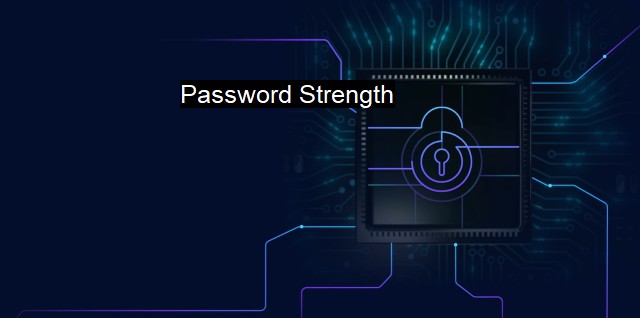What is Password Strength?
Ensuring Cybersecurity: The Importance of Strong Passwords in Protecting Sensitive Information
Password Strength refers to the effectiveness of a password in resisting guessing and brute-force attacks. In the context of cybersecurity and antivirus landscape, it is an increasingly growing concern. Given the advanced abilities of cybercriminals using sophisticated hacking technologies, password security has never been as crucial as it is today. A strong password secures your vital information, while a weak one exposes you to an increased risk of cyber-attacks.The concept of password strength is based on lot of factors like password length, complexity, and unpredictability. Using combinations of upper and lower case letters, numerical digits, and symbols would make a password more resistant to guessing attacks by not coinciding with words found in a dictionary or parts of the user's personal information, which makes the password more complex and difficult for hackers to guess.
In terms of cybersecurity, strong passwords protect not only user information but also the integrity of the whole system. For instance, an antivirus program is designed to keep a system protected from external threats and attacks. It can be rendered totally useless if a hacker could easily guess the administrative password. The strength of the password could potentially determine the effectiveness of the anti-virus and hence the fate of the entire system.
Humans are often the weakest link in the password chain. Simply because something is hard to crack does not mean it's a strong password. Users typically utilize personal information such as addresses, phone numbers, names, birth dates as passwords. Human's weak memory and a desire for convenience over security often lead to using simple and convenient passwords, which unfortunately could be easily guessed or brute forced.
Therefore, in addition to strong password creation practices, encouraging the use of password managers that can generate and store complex passwords can be beneficial. Password managers provide a level of security and convenience that balances user behaviors with the significant need to maintain strong passwords.
Even with the strongest password, mishandling could leads to breaches. Strong passwords should never be shared and should be updated regularly to keep it from becoming stale or outdated. users should be aware of phishing strategies, where cybercriminals trick people into revealing their passwords.
It's also advised to use two-factor authentication (2FA) or multi-factor authentication (MFA) processes where users are required to input an additional code, usually sent to a preregistered mobile number or secondary email, along with the password. This makes it even harder for hackers to gain entry. Also, using biometric data or physical security keys as an additional layer of security adds another wall for the criminals to breach.
In the modern digital era of IoT, where individuals have a multitude of accounts and passwords on various platforms, it is crucial to understand the significance of having strong password rules. Password best practices are necessary for keeping individual and corporate devices, data, and networks secure from cyber-threats.
While creating a strong password is just one layer of security, it's fundamental to the protection of individual user accounts and overall system security. standing alongside strong passwords, cybersecurity education and antivirus software are essential for comprehensive security. In the end, a healthy combination of human vigilance, strong password policies and effective antivirus solutions play a vital role in ensuring the entirety of cybersecurity infrastructure is well secured and protected against threats.

Password Strength FAQs
What is password strength?
Password strength refers to the level of security provided by a password. A strong password is one that is difficult for hackers to guess or crack.Why is password strength important in cybersecurity?
Password strength is important because weak passwords can be easily guessed, allowing unauthorized access to sensitive information or systems. Strong passwords are a critical component in protecting against cyber attacks.What are some characteristics of strong passwords?
Strong passwords typically have a combination of upper and lowercase letters, numbers, and symbols. They should also be at least 12 characters long and avoid using dictionary words, personal information or common password patterns.What can I do to increase the strength of my password?
To increase the strength of your password, try using a random combination of letters, numbers, and symbols. Consider using a password manager to generate and store unique, complex passwords for each account. It's also important to update your passwords regularly and avoid reusing the same password across multiple accounts.| | A | | | B | | | C | | | D | | | E | | | F | | | G | | | H | | | I | | | J | | | K | | | L | | | M | |
| | N | | | O | | | P | | | Q | | | R | | | S | | | T | | | U | | | V | | | W | | | X | | | Y | | | Z | |
| | 1 | | | 2 | | | 3 | | | 4 | | | 7 | | | 8 | | |||||||